Scott Pilgrim Set Interview: Edgar Wright, Michael Cera And Jason Schwartzman
In July 2009, I was lucky enough to have the opportunity to travel to the Toronto-based set of Edgar Wright's upcoming action-comedy Scott Pilgrim vs. The World. As you know from reading the site, I'm a huge fan of the comic book series written by Bryan Lee O'Malley and have been very excited to see it adapted to the big screen by Wright.
After the jump you can read a transcript of the roundtable interview a few members of the press and myself conducted with director Edgar Wright during his lunch break. Stars Michael Cera and Jason Schwartzman also join in for a few minutes as well.
All this week we'll be publishing interviews our press group conducted on set with the cast and crew. Read the Edgar/Jason/Michael interview now below.
Q: Because you're so meticulous with what you want, and because you're so meticulous with each of your shots – and you kind of edit the film to some extent in your head already – how are you pacing yourself? How are you staying focused throughout this whole four, five month process?
EW: A lot of espresso, basically. I think I reached me espresso limit. I don't know; just a lot of coffee and not a lot of sleep. I think on both Shaun of the Dead and Hot Fuzz, I hit the wall at both points in the production where you work so hard, and you just can't function anymore, and you have a sort of mini meltdown. On this one, it's happened, like, twice already. That's how I take a yardstick of how long the shoot is and how hard I'm working, since I've had two separate espresso-based meltdowns. It's funny, too, because working with Bill – I think in the first week of shooting – we did 200 slates ... um, in six days. And everyone was commenting on how much it was and how fast it was, and I said to Bill – I said, 'at the moment, I get to go back and make a film every 3 years, so I've been waiting 3 years to get back on set.' So when I start going, I get out of the gate with a kind of fury and stuff because I've been thinking about it for a long time.
EW [contd] ... But you have to have the patience for this sort of stuff, because we've been doing the second unit as well, which I'm usually there for – a six-day week sometimes – and you can't get through 17 weeks of six-day weeks. It's tough. The thing about this film is that I made it extra difficult for myself in terms of it being not just comedy, and not just visuals, but there's action and music as well. All those four separate things require so much care and TLC, and any one of those things would be complicating in a different film, and this one has all of it. And I think because of the source material and the actors, and some of the collaborators that we've got involved, and the fans as well, it's just this huge responsibility in every department and every compartment of it to make it as good as it can be. And that just means working yourself into the ground. I did this Q&A with [inaudible] on Sunday with me and Bill where we showed the American Army of Darkness, and somebody said, 'So how's the shoot going?', and I was like [whispers] 'Look at me'... [laughter] And that was my answer. I had a fresh face at the start of it.
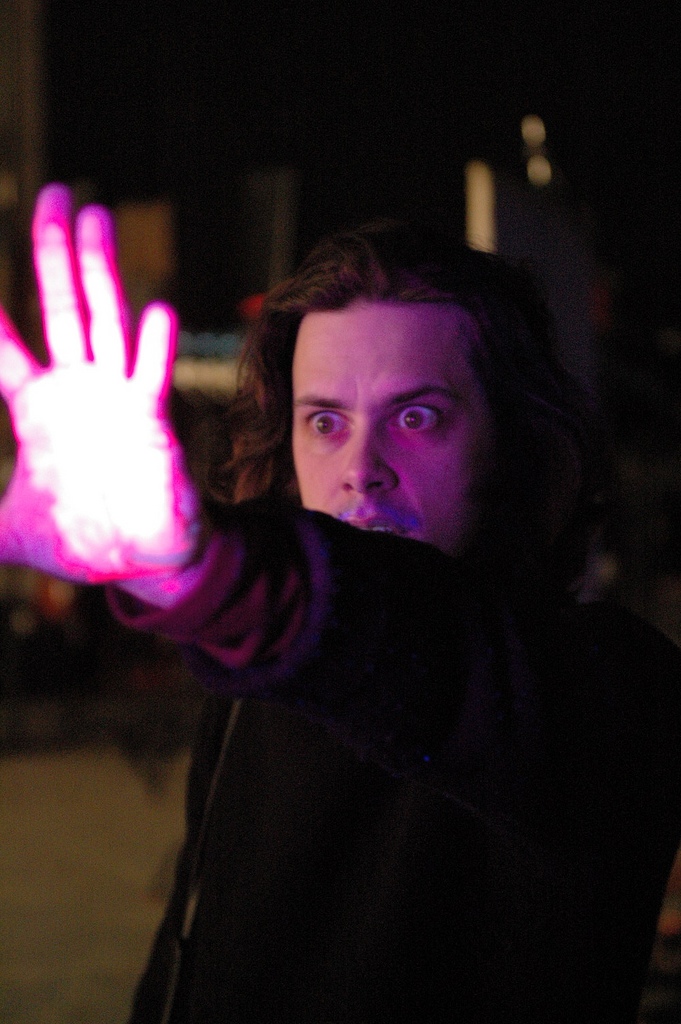 Q: Normally on a set visit we'd ask about the scene you're shooting today, and I know it's the end of the film so you can't really tell us much ... but what can you tell us?
Q: Normally on a set visit we'd ask about the scene you're shooting today, and I know it's the end of the film so you can't really tell us much ... but what can you tell us?
EW: Well I feel so bad about this because the timing of it ... literally, it'd be like showing up on the set of Empire Strikes Back for the "Luke, I am your father" scene. It's the worst timing. I wouldn't even minded if you'd been here yesterday when we were just fighting. Seeing Jason and Michael fighting ... I would've been happy; it's a thrill to watch the two of them duking it out.
Q: You've been working so hard on this, but everyone we've been talking to today has been really up and going ... so are they, like, on painkillers, or is it just like the vibe of the set ... or, what keeps everyone going?
EW: Well, firstly the cast are all very young. They've got the energy of 20-year-olds. The cast has just been amazing together, and I think it's just a really good ensemble. It feels really like having a cast full of ringers in terms of everybody in every tiny part is really great. And so to have like big ensemble scenes with ten of them in the same scene, or five of them in the same scene, it's just really good fun. Like with Hot Fuzz how we had great people in every single tiny part, it's the same with this. What's great with this is that there's people you know, like with Michael [Cera] and Jason [Schwartzman], and then we have people who are up and coming, like Anna Kendrick, Aubrey Plaza and Brie Larson, and then there's complete unknowns as well – and so to have that mix of people is really exciting.
[Bill Pope walks on set] EW: Bill Pope is an absolute chore to work for. [laughter] Ask him about the sex scene in Team America. [laughter]
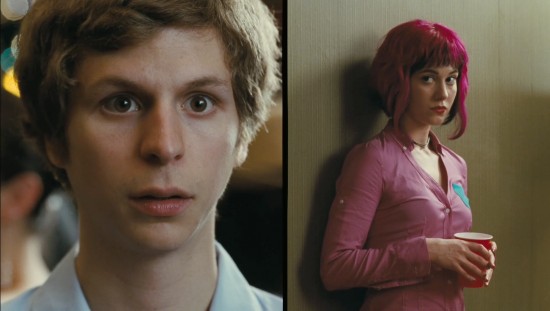 Q: We just talked to Alison and Johnny, and they seem perfect for their roles, but was there any pressure to get name actors? It seems like you got the right people for the right parts, which is strange for an American movie in some ways; it's not like names or whatever ...
Q: We just talked to Alison and Johnny, and they seem perfect for their roles, but was there any pressure to get name actors? It seems like you got the right people for the right parts, which is strange for an American movie in some ways; it's not like names or whatever ...
EW: Universal never really gave me any problems about casting bigger people, because in a way Michael has starred in two $100 million-plus movies, and also a lot of the other people, though their not the biggest names, people certainly know who they are. You know who Jason is, and who Chris is, and Mary has a sort of rising profile. I think, then, when you have 20 of those people in the same film, it's really good. We have fantastic people in lots of small parts, so I think it's kind of a nice in a way – and the thing I'm really pleased about with this film, as opposed to some of the other comedies out there – and even stuff I've done before – is that it has a lot of funny women in it. Really a large part of the cast, and even the books are not just about his love life, but his exes and family, and friends. There's this one scene the other day that I would describe as "the funny lady relay race," because there's one scene which starts with Anna Kendrick, then switches to Aubrey Plaza, then switches to Mary, then switches to Brie Larson, and it's just Michael being attacked from all sides from all the different women in the film. In this case, not literally attacked ...
Q: We've heard a bunch of times today that this feels like doing a bunch of mini movies. So, would you agree with that, and if so, how do you keep tonal continuity throughout the picture?
EW: I think it's more in terms of the length of the shoot, and the nature of the exes, where it feel like more of a TV series because it's, like, Chris Evans month, and then it's May Whitman month, and then Brandon Routh month ... so I guess that's the way it sort of feels like. But it's like a seven deadly sins-type film ... well, in this case it's six because one of them is twins, so you're going through six hoops, basically.
Q: One of the things I loved about the comic book was the visual gags where people come on screen with title cards and stuff. How did you incorporate that, or how are you planning to incorporate that?
EW: Well, I'm planning to be pretty true to the books in that respect, because one of the things that intrigued me about the books – or one of the things that got me interested – was that I felt like there hadn't been a comic book adaptation, aside from maybe Ghost World and American Splendor, there hadn't been a bigger film that dealt in sort of like a comedy comic book film. There are either ones going for the more fantastical and more gritty, or other ones going for an entirely different universe, and what I liked about this is that after I read the first book it reminded me of Spaced, in terms of combining the mundane with the fantastical. And so I think it came down to why not use those graphics, who not have that aesthetic to it – and in a comedy you can do a lot of things that you can't do in a straight action film. In this scene here, Michael fights, like, 20 men – and it's just an example of what you can do in this film that you can't do in an action film, is that when they die and explode into coins, you can keep using the same sound over and over again. In an action film, you would always have to have 20 different hits, but here if you keep playing the sonic coin sound over and over again, it becomes funnier and funnier.
Q: Does that happen to Chris – turning into coins?
EW: Everyone turns into coins. That's my way of getting around the R rating. You chop off someone's arm and it falls into coins, you get the PG-13.
Q: What does it do to your filmmaking style to do an adaptation instead of something original?
EW: It kind of morphs between ... there are bits where we tried to do specific panels, and I think the two meld together pretty well. There will be bits where you'll be able to see the page come to life, but I think in terms of the overall flow, it's probably more similar to the stuff I've done before. But I was really inspired by the artwork, and I guess the final product is an amalgamation of that and my style of shooting things. A lot of the action scenes are longer than they are in the books. So it's a bit of both, really, and that's what's sort of fun about it. I thought that when I was reading it, it'd be a chance to do a sort of pop-art film, and those comic book films hadn't really been done since the '60s.
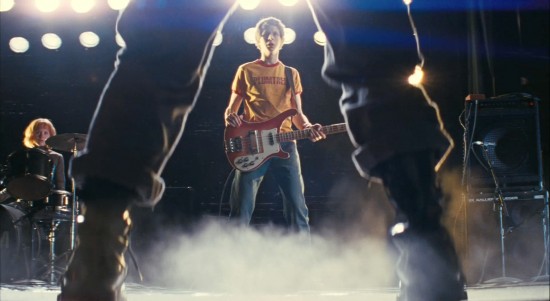 Q: I was wondering about whether or not you were concerned about casting semi non-musicians? I know some of them are and some aren't. I know Sex Bob-omb isn't supposed to be the best band in the world, but ...
Q: I was wondering about whether or not you were concerned about casting semi non-musicians? I know some of them are and some aren't. I know Sex Bob-omb isn't supposed to be the best band in the world, but ...
EW: Well, you know they all worked really hard, and there's a mixture of people who can play. Like Michael is a great musician – and then there's a mix of people who can play, and then people who had to learn an instrument for the part. But they worked really hard at it, and it shows.
Q: How did the music come about? Where did you begin deciding what to use?
EW: Well ... in terms of bands in the film?
Q: Yeah, the music you use in the film.
EW: The stuff that'll be on the soundtrack ... Brian had playlists for all the books, in the back of the books, and he kind of introduced me to some artists that I wasn't aware of. And then there were some songs – like one or two songs – that I had mentioned to him that he put in the second book as they were coming up. So we have this nice crossover of bands that I've played him and vice versa. Certainly a lot of the Canadian music that I wasn't aware of. I mean, I knew who Metric were, but I wasn't familiar with some of the other bands. Like Sloan ... and how Chris Murphy formed a major part in this by being our guitar coach, and he'd been fantastic. So it's been really nice – this sort of music exchange. And in terms of bands, what we tried to do was find a real band for each of the fictional bands, because usually in music films you have one composer who does everything. That sets a sort of house style, and sometimes that works great, like Phantom of the Paradise how Paul Williams does all the music for all the bands, but they all sound like Paul Williams songs, which is great. But for this we wanted to have a different band for every single artist that appears, and we've done that, and that's kind of really fun.
Q: How did you approach the fight scenes in this, because they aren't supposed to be brutal and cruel?
EW: I don't know how to describe it, really ... um, they're just really fucking fast. It's just a mix between crazy, sort of superhuman comic stuff and the speed of the Jackie Chan stuff from the '80s. The thing that's funny about Brad Allen and his team is that you'll put together a sequence in storyboards that is pretty damn complicated and ambitious, and they'll just raise your game in terms of amping it up another notch. It's nuts, you'll ask Michael and Jason and they'll tell you that they've never done anything like this before. There are some days where we've done 20 shots in a day, but we only have about 15 seconds of screen time.
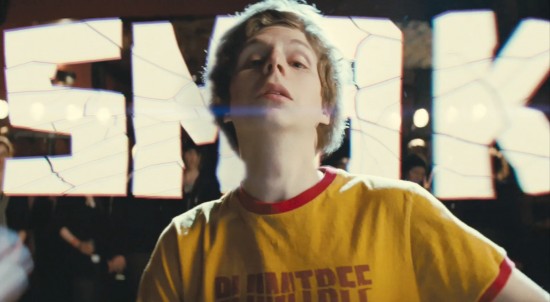 Q: I think you make some of the best DVDs out of your films. Do you already have plans for that, and do you know what the runtime will be?
Q: I think you make some of the best DVDs out of your films. Do you already have plans for that, and do you know what the runtime will be?
EW: Oh, that's a ways off in terms of thinking. There's a huge amount of making-of stuff – some of which has already been online – but there's lots of fun stuff in terms of rehearsals ... all sorts of stuff. There will be an enormous amount of stuff.
Q: How are you handling the tonal change of the books, where things go from kind of crazy to really crazy at the end?
EW: We thought it should play out like a musical in a way in terms of the fights are not dissimilar to the songs. I always thought there were a lot of martial arts films that were like musicals, so we wanted to take that further. Ya know, in a Gene Kelly film when he performs an amazing routine, at the end of the scene no one goes, 'Oh my god, that was fucking amazing!' The song is about something, and then there might be some dialogue at the end that is also about that theme. And that's kind of how this works where people have these huge fights – and it's kind of like how it is in the books – where everything goes back to normal, and there's a little reaction to what just happened, but there's no sort of mourn the dead. All the fights are about relationships, and we start off very mundane, but as soon as Mary enters it as a very literal dream girl, then we sort of start getting into the surreal. If you look at the Scott Pilgrim books, the poses that he does on the front covers are very rarely in the pages, and me and Brian always talked about how the Scott Pilgrim on the covers is who he thinks he is, rather than who he actually is. In a weird way, I think the whole film is his sort of diluted cheese dream of him as a badass. If you start in a very real place, you can flower into the fantastical.
Q: Did you know early on that Cera would be good as Pilgrim?
EW: When we first started writing it, I was watching Arrested Development. I did the first draft of this before Hot Fuzz, and I remember saying that it's a shame that George Michael kid isn't older. It's funny – and me and Brian have talked about this a lot – when people on the internet say he's so miscast, but then the people they suggest leave you going, "Yeah, but I don't want to make the Zac Efron version of Scott Pilgrim." So it's like whenever people come up with suggestions of who it could be, I'm like are we reading the same books? I mean, shouldn't he be like an underdog, physically? I read one thing on the internet where someone said Chris Evans would be better as Scott Pilgrim, and I thought, really? The whole thing about casting Scott Pilgrim vs. Lucas Lee is that you've got two levels ... I mean, immediately the thing that comes to mind is who wouldn't want to see a fight between Michael Cera and Chris Evans? That to me is a lot more intriguing and funny than to have someone who's like a hottie or a hunk. It didn't make much sense to me, really.
Q: Back to the music for a moment, Plumtree came up with the name Scott Pilgrim, and Brian said they're gonna be in the film – do you know where?
EW: Well we're definitely going to use one of their songs, and that t-shirt is on prominent display in the books, so Plumtree will have their name splashed all over a huge portion of the film. [laughter]
Q: You're working with Bill Pope on the film, and If you look at The Matrix or how difficult Team America was to shoot, was he one of the guys you felt you had to have to make this movie? How did you end up with him as your DP?
EW: I met him in LA and I'm obviously a huge fan of his work, but the thing about Bill is that it's unusual to have such a great director of photography who's great at action and comedy, and performances. He thinks about the whole script, and sometimes you can have a director of photography who only thinks about visuals and nothing else, and Bill just isn't like that – his connection to the books and the script; he would talk as much about the story and characters as we would about how it looked, and so that's kind of the clincher. That's why he's at the absolute top of his profession, because he's more than just a director of photography. And also what's so intriguing about Bill is what's the thing he shot immediately after The Matrix? He shot Freaks and Geeks. Straight after The Matrix, he shot the pilot for Freaks and Geeks. And so I said to him, 'Imagine a film that's in between the two.' [laughter] That was basically my pitch to him: imagine a film that's equidistant between The Matrix and Freaks and Geeks. I said to him in rehearsal, "Imagine a film that's like in between the two." That was basically my pitch to him. I said, "Imagine the film is equidistant between 'Freaks and Geeks' and 'The Matrix'."
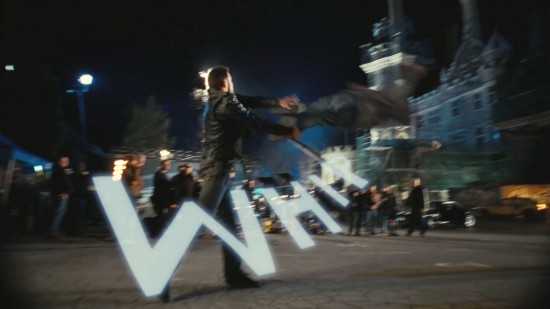 Question: Shall we let you eat?
Question: Shall we let you eat?
Edgar Wright: No, I'm good. I'm totally good.
Question: Are you sure?
Edgar Wright: I'm good to give these guys time. No, it's cool.
Question: What will the fight sequences look like? There were these rumors that there are going to be animated elements incorporated.
Edgar Wright: There's basically a bit of everything that goes into it. Some of it is very real and fast and you'll be surprised by how much the actors do, which is, I think it's a surprise to them as well. They're so game as well, that you really should ask Michael and Jason about it. Jason endlessly amuses me, because you can basically throw anything at him and he'll kind of like for a second go, "Okay, let's do it." There'll be this split second where he's thinking, "I've got to do that?" But the fighting is kind of comprised of an enormous amount of different techniques, really. It's kind of about bringing the artwork to life and also something that would feel– it definitely feels very stylized, but in a very fun way, but it still feels kind of dangerous. It's not brutal, but it feels painful, so it isn't like necessarily silly fu. It's difficult to explain really. I think Michael takes a pummeling in every single fight, which is just funny. We have a thing as well, it's just funny those things you can do in this film, like people reset themselves all the time, in the sense of, I just thought it would be a bit like a video game, where after being thrown through a wall, somebody has dust on them, but only for the shot just after they go through the wall. Then they just kind of keep resetting. So people's hair just resets and there's never any blood or bruises or broken teeth. There's hardly anything like that in terms of physical injury. It's usually shown by how much their hair is blown back, but it's still kind of brutal in that respect in terms of just the speed of it, I guess, and the amount of gags. It's difficult to explain.
Edgar Wright: Aah! You're coming to join. How are you doing man?
Publicist: Everyone, this is Jason Schwartzman.
Edgar Wright: They know who he is.
Jason Schwartzman: Are you in for the H4? I have the H2.
Edgar Wright: That is enormous that one.
Jason Schwartzman: Have you seen the new H4? There's another H4 now.
Question: I know it looks like a taser.
Jason Schwartzman: But this one you can plug guitar right in or an XL right in.
Edgar Wright: It looks like a taser at the top there.
Jason Schwartzman: Yeah.
Question: Plug something in and play a tune.
Jason Schwartzman: Yeah. Jeremy from Aint It Cool sends his love. I just got off the phone with him.
Edgar Wright: Were you just doing stuff for funny people?
Jason Schwartzman: Slow down, slow down, slow down.
Question: I want to ask, what are the post production costs going to be like on this compared to the other movies? Is it going to be just insane, eight months of CG and everything?
Edgar Wright: Yeah.
Question: Is it strange for you to see stuff from Paul, stuff from the set from that movie? Because you and Simon and Nick have worked so closely together. Now you're doing this and they're doing their road movie together.
Edgar Wright: You know, not really, because I think as we intend to do, I think because they're filming in the States, I don't feel– if they were making a film in London without me, I think I'd be bummed. But because they're doing something in New Mexico, it's fine. It's good. It's nice that it's happening at the same time. It synchs kind of perfectly.
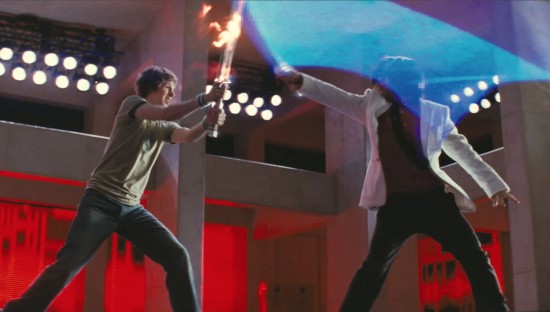 Question: The Frisbee video blogs were great. It was fun to see.Question: Everyone else we talked to said, "We stay close to the books. We stick to the books." You don't have a book yet. There is Gideon's malevolence throughout the book, so have you drawn from that, and how much do you know about your character?
Question: The Frisbee video blogs were great. It was fun to see.Question: Everyone else we talked to said, "We stay close to the books. We stick to the books." You don't have a book yet. There is Gideon's malevolence throughout the book, so have you drawn from that, and how much do you know about your character?
Edgar Wright: You had to pick Bryan's brain basically, didn't you?
Jason Schwartzman: Yeah.
Edgar Wright: We both did.
Jason Schwartzman: Yeah. You take it and then I'll– you start it off.
Edgar Wright: Well, Bryan did a thing for everybody on this film which was good for us and was really good for the actors, is that he did ten facts about each character. But in terms of Jason's stuff, we had what we'd written already, and then in terms of back story, it was something that was just developing or based on certain people and things that Bryan was still working out. But the "Art of War" came into it, didn't it?
Jason Schwartzman: Yeah. Basically, first I had this great script that Edgar and Michael had written, which has so much Gideon in it, and just based on some of the things he was saying, it immediately eliminated a lot of possibilities of who this guy was. Like if he's capable of saying and doing certain things, you have a pretty good understanding of this type of person. And then, like you say, his malevolence– I'm not going to be able to say that anymore. I tried twice more– that presence is cast over the books and you can feel him. And I did talk to Bryan. I had some good phone conversations with him and he gave me a lot of really good advice about the character. Shall I tell you that, or just hopefully it will come through.
Question: You don't have to tell us.
Jason Schwartzman: And he said something to me which was nice. He said, "Hopefully I'll learn something about the character too from you guys." So it kind of worked, he's like, "I'm still trying to figure it out too, because I've got a little ways to go on him." So it's nice. My character actually is alive and is still being figured out. I did buy "48 Laws of Power" and the "Art of War." I would listen to those every morning on tape, book on tape.
Michael Cera: I have that on tape too, the "Art of War."
Jason Schwartzman: It's great, it's great. It's a classic. But the "48 Laws of Power" is an incredible book. I'm on law 15, so that's all I've got so far in Gideon. That's all I was able to cram in. I could only get 15 chapters of laws and power into my guy.
Edgar Wright: The rest will go on the DVD.
Michael Cera: Is that Donald Trump?
Jason Schwartzman: No. But the guy also wrote the seduction, the book on seduction, which I've also read, and his new book is the "33 Laws of War." So he's a great writer.
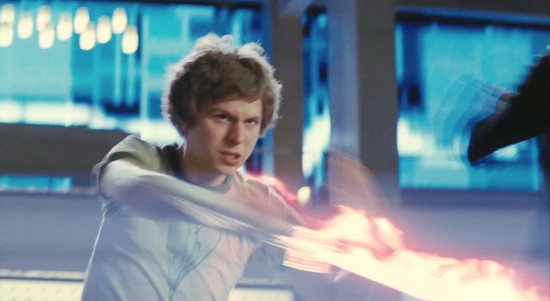 Publicist: And I know I don't have to introduce Michael.
Publicist: And I know I don't have to introduce Michael.
Jason Schwartzman: The last thing I'll just say is, but Edgar is so great, because I have all these different ideas. When I was here, when I first got here, I was here about two weeks early to start training for the fight and I would have all these crazy ideas. He listened to all of them and he's just like welcoming all these wonderful ideas.
Edgar Wright: And then just saying, "Just do that."
Jason Schwartzman: Dismissing the ones– yeah, dismissing the ones that are improper. I'll be like, "What do you think of this? What do you think of that?" No, no, no." "Yes, yes, yes." And then just so encouraging.
Edgar Wright: One thing that's been developing through this film which is funny, even in the last couple of days, is that Jason, no matter during the terrible things that he does, he still remains very likeable. And even Bryan mentioned the other day, he said, "I feel like I like Gideon too much. Even after he kicked that lady in the tummy."
Jason Schwartzman: She deserved it.
Edgar Wright: But I like the fact that he's kind of like that. He's got to be a charming baddie. He's at the top of the pile.
Jason Schwartzman: Yeah.
Question: Jason and Michael both, what's the worst thing Edgar's made you do so far?
Edgar Wright: I was explaining to them already the look on your faces, usually when we show you a stunt at the eleventh hour. I show you a new stunt with five minutes' warning.
Michael Cera: I don't know, what do you think is the worst thing that we've done?
Jason Schwartzman: We've both deferred our first questions to Edgar.
Michael Cera: We're in director/actor mode right now.
Jason Schwartzman: What do you think I should say?
Michael Cera: I can't think of anything too dangerous. It's all been pretty safe.
Question: When we were at Sundance, you were talking. It was before you had actually started the training for this and your answer there was, "I'm going to do as little as I can."
Michael Cera: I think I've stayed true to that.
Edgar Wright: I think that's true.
Question: There's a lot that looks like you're very involved.
Michael Cera: Yeah. I guess the only things we don't do are like falling from the scaffolding and going through walls and stuff.
Jason Schwartzman: Yeah.
Edgar Wright: Don't give it away. Don't give away the movie magic.
Michael Cera: But that doesn't happen in the movie anyway, so why would we do it?
Question: Michael, I was wondering, this is a very different character for you. I was wondering if that's what drew you to the role. And also, Scott has a hyperactive energy to him, and I was wondering if you embraced that or went a different direction?
Michael Cera: I can't remember. We shot so much of this in the beginning of the year. I didn't try to go against the energy in the books. I mean, I think I tried to do that, but I really can't remember.
Edgar Wright: I think one of the things that's interesting, like– I was saying about that Bryan did those lists of ten facts about the character.
Michael Cera: Yeah.
Edgar Wright: And nearly all of Scott Pilgrim's facts revolved around the fact that he believes he is the hero in his own movie in his head. And so I think that's the thing, it's sort of the character. Until the end, he doesn't really think of the consequences of things emotionally. I don't know. He's like the center of his own universe until it comes crashing down. I've got to say, everybody like, Michael, no exceptions, worked so hard on the fight scenes in terms of– I think it's because you've both got a musical background, that you're both very good at the choreography. I think that's definitely a thing that people have a dance background, like Mary and Mae, and you guys that have musical training, it actually plays out in the fight scenes in just the timing.
Jason Schwartzman: And then there's the people with no rhythm at all.
Edgar Wright: Yeah, the people with no rhythm get their heads kicked in.
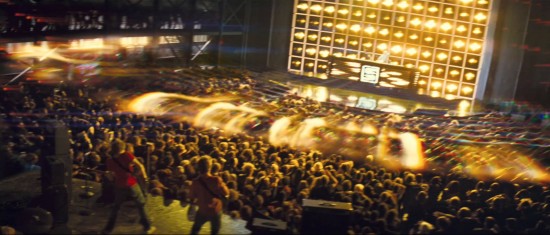 Question: I was just going to ask you about that. It seems you have a vast musical background and you're playing one of the few characters who's not playing. Is it strange to be in that kind of musical movie with so much of that is going on, without you being involved in it?
Question: I was just going to ask you about that. It seems you have a vast musical background and you're playing one of the few characters who's not playing. Is it strange to be in that kind of musical movie with so much of that is going on, without you being involved in it?
Jason Schwartzman: No, it's fun, it's fun. No, I'm happy. They're all doing good. They're all doing good. They all look like they're playing instruments and I'm happy to watch. I get to sword fight. Yesterday I was hanging–
Edgar Wright: Spoiler alert.
Jason Schwartzman: Yesterday I was hanging upside down. I was hanging upside down from a harness and I looked around at everyone's feet, because that's all I could see, and I thought, "Man, if some of my friends in high school could see me now," especially the ones that were mean to me. Those weren't my friends. They're just some of the people in high school, if they could see me now. We've gotten to do so much fun stuff on this movie. I don't know, it's been incredible. I do wish I could have played some music though with everyone. Maybe Gideon could.
Question: Lots of rewrites. Obviously the way this is being shot is very meticulous. There's a lot of precision in terms of what's shot. Do you find as actors you have to adjust your style in terms of how you perform or how you stay consistent in a performance through that?
Michael Cera: Kind of, but every movie's different really, so there hasn't been anything consistent for me really in that way. But this is definitely unique in that there'll be some– I don't know, am I going to ruin anything? But there'll be certain shots designed for just one line, so you'll do something things line at a time. So that's been kind of new for me. Although yeah, every movie is kind of different, I guess, so I'm not used to any one style.
Jason Schwartzman: Yeah, I'm like Michael. Everything I've ever done has been different, so this is just a brand new great experience and I'm happy to do it. I'm only really in three or five– I don't know, I can't say exactly– but a lot of scenes in this movie.
Edgar Wright: Three scenes, 2,000 slates.
Jason Schwartzman: But they take a lot of time to do one scene, and that's new for me. The scenes are very long and have many different components and elements and are very detailed. Like Michael said, yeah, you'll just do one certain thing just for a certain line. I don't know, that's the beauty of it. It's really incredible. But Edgar, it actually feels super liberating to have just these certain things we're going for, because then you really can hyper focus and try different things in just in one moment, and just try a different face or a different version of a line, and not have to think about the whole thing, in certain instances. So it's cool, because you can really like be very meticulous with your acting.
Question: When we chatted to the other actors, talking about how each of the exes came onto the set... Can you talk about your experiences with each of them?
Edgar Wright: Like I was saying, it felt like we'd have a different month with each of the actors. What's great is everybody brought a completely different energy to it, and then Jason, like the master criminal, gets to come in at the end and figure out a way to upstage them all in the final moments. It's what's really fun about it, is that there's I think some of the cast people that you might expect to see together, or you've seen them together in other films, and then what's fun is sort of seeing you do a scene with Chris, who is a very, very funny actors, who's maybe done films of a different genre, would seem to come from another world, but not. He's a great comic actor. That's what's exciting about it, is that it isn't the same mix of people in a film. It's like a radically different mix and it's just exciting to watch actors spar together in both senses of the word.
Jason Schwartzman: Literally.
Edgar Wright: Literally and verbally. It's really fun. And so everybody brings a slightly different energy to the exes and I think different actors are very surprising in terms of Brandon is a revelation in some respects. He did a brilliant job. And Satya Bhabha who, it's pretty much his first major part in a film, and then Mae Whitman unrecognizable from previous parts. So it's been really good fun in that respect.
Question: Are you guys involved with the video game at all?
Edgar Wright: I've been a little bit involved, but obviously whilst this was going on, but Bryan has been involved which is cool, so I kind of deferred, whilst I'm shooting, to Michael Bacall and Bryan, and my brother as well, who's kind of working at it.
Question: Will there be overlap with the voice actors?
Edgar Wright: I don't know yet. Honestly, until this is wrapped, I haven't really put too much thought into it.
Question: How involved is your brother in this? Is he doing design?
Edgar Wright: Yeah. Especially with something like this as well, because he's an amazing artist. So it's a great chance for him, even more than previous films to do. So there's parts of the animation that he's doing, which is really exciting. So it's great with each successive project to work with him more and more.
Question: You've been working with Mae again in this film now, Michael.
Michael Cera: Yeah.
Question: A radically different dynamic between the two of you. How was that to work together again?
Michael Cera: Great. It was really fun. And Mae was there for a lot of training too. I don't know, did we ever get to sword fight with Mae? I don't think so.
Edgar Wright: The training period happened before the shoot and all of the exes were here at the same time so that was a fun experience, in terms of we were all together–
Jason Schwartzman: It was like a month.
Edgar Wright: Actually a couple of months.
Jason Schwartzman: Yeah, it was great.
Edgar Wright: Then actors would not be in the same scene again. But there was a period at the start of preproduction where we did two hours of work out in the morning with sword fighting.
Jason Schwartzman: He came every day to work out with us. How many directors would do that, like come work out with the actors for two hours?
Edgar Wright: We would have sword fighting tournaments. And it was funny, even some of the actors that don't get to fight, like Kieran Culkin, who doesn't actually fight, would be sword fighting–
Jason Schwartzman: Fighting Chris Evans.
Edgar Wright: And be an absolute terror and kick the shit out of people.
Question: Was it attractive to you to be able to come home and do something that's such a specifically Canadian story?
Michael Cera: Definitely, yeah. I love that about the graphic novels, growing up in Toronto. It's going to be a really special movie for Toronto people, or Canadians in general, I guess. But yeah, I really liked the idea of working here and getting to–
Publicist: We're going to need Michael and Jason in a minute, so maybe one.Question: Just one quick question. You already played guitar coming into this, but Mark and Allison have to learn their instruments. I was wondering what that rehearsal process was like for you.
Michael Cera: Well, by the time we–
Edgar Wright: Less rehearsal for Michael!
Michael Cera: They had to learn their instruments separately before we got together and started doing the songs. So by the time we all got together, Allison was really good at drums and Mark was pretty good at guitar already.
Question: Will you play a live concert?
Michael Cera: I don't know. I really want to. I wanted to play the songs at some point.
Jason Schwartzman: It would be incredible.
Michael Cera: They're really fun to play. Yeah.
Question: At least show up at Show West or something.
Michael Cera: That would be so cool. That would be fun.
Jason Schwartzman: I would say that the stuff I've seen of the music looks so good. It looks so real. Sometimes music's not handled correctly, like they don't look like they're playing. It really looks like you guys are playing.
Michael Cera: Good.
Question: Edgar, are you doing any music videos on the sets while you still have them up there? Are you going to try to get some music videos going?
Edgar Wright: You know, we did. In a couple of instances, we shot whole songs, because the songs are so good. I kind of had it figured out how long they'd appear in the film. On three occasions, I really pushed to shoot the whole thing, thinking, "We'll need this at some point." So two of the Sex Bob-omb songs and Clash of Demonhead song, we shot the entire thing, so we'd have it.
Publcist: Thank you, gentlemen.Question: Thank you for your time.Question: Thank you.
Michael Cera: I can't wait to see "Avatar."
Jason Schwartzman: We have it on DVD if you didn't have it.
Question: Edgar, I ran into Jason Reitman at Comic-Con. He was like, "I just got pulled over by three people yelling at me for not brining Scott Pilgrim."
Edgar Wright: I know. I saw that on his Twitter. It was so funny. I know. I talked to him about that. It was so funny.
Question: What was your favorite film of the summer. I see you holding up the ticket stubs.
Edgar Wright: I guess in terms of live action, I'd say "Star Trek" and "Up." What else?
Question: Did you like "Drag Me to Hell"?
Edgar Wright: I did like "Drag Me to Hell," yeah. What else has there been? There's been a lot of good ones, actually.
Question: Did you see the "Brothers Bloom?"
Edgar Wright: I didn't see the "Brothers Bloom" actually. I saw "Moon," which I really liked. What else has there been? Hang on a second.
Question: And you loved "Terminator [Salvation]" obviously.
Edgar Wright: I don't want to be dragged into that conversation. I did put a thing on my blog. I usually show what I thought of it, like if there's a packet of Tylenol next to it. If I like it, it's Junior Mints. If I don't like it, it's Tylenol. That's my code.
Question: Thank you again.
